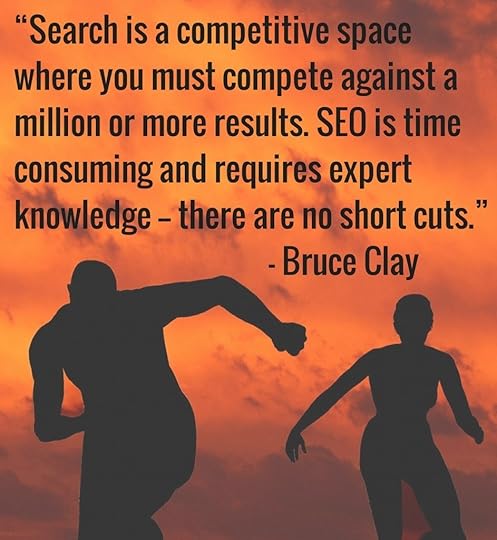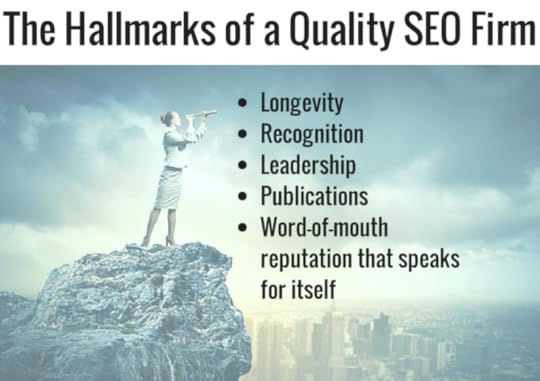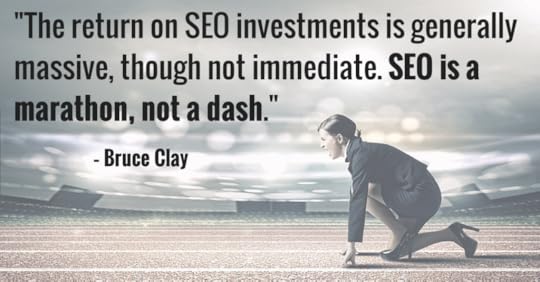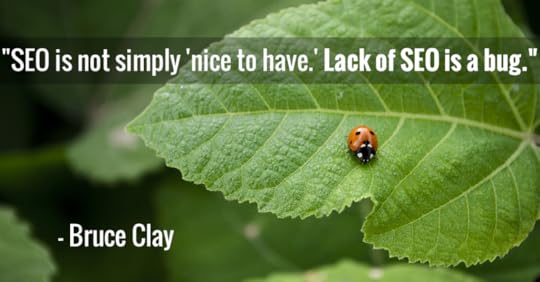Is SEO Worth It? 7 ‘Bruce-isms’ to Make the Case to Management
Is SEO Worth It? 7 ‘Bruce-isms’ to Make the Case to Management was originally published on BruceClay.com, home of expert search engine optimization tips.
Bruce Clay is the president of Bruce Clay, Inc., an industry leader and SEO lifetime achievement award recipient. In his nearly two-decade SEO career, he’s advised thousands of businesses on how to take their a web presence to the next level with SEO. With clients ranging from small business owners to Fortune 500 executives, Bruce has had a firsthand view of what it takes to double, triple and quadruple web traffic and conversions for business in every industry. Bruce is also a generally quotable guy. Ever heard this one?
“It is not the job of search engine optimization to make a pig fly. It is the job of SEO to genetically re-engineer the website so that it becomes an eagle.” Yep, that’s Bruce! (Tweet This!)
When Bruce is presenting on SEO at an industry conference or education event, I can tell you there’s a rush of gold nuggets on Twitter attributed to him. I recently picked his brain to get some tips for in-house SEOs looking gain buy-in for growing SEO resources. As expected, we’ve captured some keepers. If you’re an in-house SEO and any of this sounds familiar to you, feel free to pin and tweet some classic Bruce Clay quotables.
What the C-Suite Needs to Know About SEO
What are the chief factors that management should know about SEO? Bruce wants CMOs and CEOs across the board to consider the following as they move on an SEO initiative:
SEO is an Investment
Choose an SEO Firm Wisely
An SEO Agency Can Be a Powerful Ally
SEO is a Marathon, Not a Dash
Cross-Train Marketing and IT Departments on SEO Initiatives
SEO, PPC and SMM Should Join Forces
Lack of SEO is a Bug
1. SEO is an Investment
 Understanding the value of SEO is the first step in deciding if SEO is worth it for your business.
Understanding the value of SEO is the first step in deciding if SEO is worth it for your business.
“SEO generates traffic and branding within the organic search results on Google, Bing and Yahoo! SEO takes effort, energy and focus. It’s a competitive space where a company must compete against a million or more results. SEO is time consuming and requires expert knowledge — there are no short cuts,” Bruce says. [Tweet this!]
2. What to Look for When Choosing an SEO Firm
Bruce recommends that SEO companies be selected based on impressive track records of successful projects. They should have longevity in the industry and support or sponsor industry events. They should have seasoned consultants on staff that are recognized leaders, whether its published authors or conference speakers. An SEO firm’s results and word-of-mouth reputation should speak for themselves. [Tweet this!]
“Furthermore, the best SEO companies have never had penalties. They’ve never purchased links or taken short cuts. When selecting an SEO company, research them and make sure they’re not violating any search engine terms of service. If you hire an SEO firm that engages in unethical practices, they can burn your site to the ground and cause irreparable damage to traffic from search,” Bruce warns. [Tweet this!]
3. An SEO Agency is a Powerful Ally for the In-house SEO
Bruce recommends that, ideally, businesses should have an in-house SEO as well as a consultant from an outside SEO firm. Moving the needle can be a difficult task, and the additional knowledge and support an SEO agency can provide an in-house SEO is invaluable. The additional power can fuel the the current SEO efforts, with the in-house SEO orchestrating the website changes that the consultant advises. Search engines are constantly evolving. What worked two years ago and was able to generate traffic is today’s penalty.
“It’s crucial to stay current with the latest SEO methodology – that’s very time-consuming, though. It requires several hours a day that a solo in-house SEO probably doesn’t have. An SEO agency or consultant can be a powerful ally, filling in the gaps by mentoring and guiding an in-house SEO,” Bruce advised. “Get the best of both worlds with an in-house SEO manager AND an SEO consultant.” [Tweet this!]
4. Set Expectations: SEO is a Marathon, Not a Dash
Set expectations from the start (and throughout) by making it known that search engine optimization takes time. Be prepared to prove ROI, and remember that success doesn’t happen overnight — SEO is an investment. The reward for that investment is usually major.
“Our clients’ budgets vary between $3,000 and $40,000 per month. The return on those investments are generally massive, though not immediate. It can take five to seven months to see the full benefit of SEO, as there is a lot of work to be done and changes to be made,” Bruce explained. “SEO is a marathon, not a dash.” [Tweet this!]
5. Cross-Train Marketing and IT Departments on SEO Initiatives
In most companies, the IT team is separate from the marketing team. When it comes to SEO, however, both departments should be trained on SEO at the same time. Each needs to understand what’s at stake and know what will hold back SEO if it’s not done correctly.
“As a result, both departments will understand why changes need to be made and understand how to implement them together,” Bruce says. “It’s the job of an SEO to evangelize to both departments and get them to understand that the SEO initiatives will help everyone.” [Tweet this!]
6. Create a Unified Front: SEO, PPC and SMM Join Forces
SEO, paid search and social media marketing are all valuable sources of traffic. Bruce points out that of the three, SEO is often the most economical, but it’s also very technical to implement – and it takes longer to see results.
Paid search, on the other hand, usually operates with a massive budget and offers nearly instantaneous traffic. Social media marketing drives awareness and can result in increased search activity. Social media posts often function as miniature press releases that spur both traffic to your site and searches for your keywords.
“Together, all three synergistically create a united digital marketing front that reaches multiple audiences, builds your brand and drives traffic to your website. That being said … it is still the job of the website to make your visitors convert,” Bruce says. [Tweet this!]
7. Lack of SEO is a Bug on Your Site
It’s important to understand that SEO is not just an option — it’s a necessity. Frame the conversation so that the C-Suite and the IT team think of a site without SEO as a site with a bug.
“SEO is not simply ‘nice to have.’ Lack of SEO is a bug on your site,” Bruce asserts. “SEO deficiencies cost you traffic. If you can get management and IT to consider lack of SEO a bug, it will become an increased priority.” [Tweet this!]
Is SEO Worth It?
Search Engine Optimization (SEO) is one of the best investments a business can make. Eighty percent of web traffic is derived from organic placement; that’s a powerful fact to remember when making the case for a bigger SEO budget or additional resources. Organic traffic — and the conversions and sales that come with it — is up for grabs. If you’re considering implementing or strengthening an SEO initiative at your company, consider the above seven recommendations when choosing an SEO.
Is SEO worth it? You tell us. Tell us about the challenges you face when making the case, and what’s worked for you in getting executive and inter-department buy-in in the comments!









